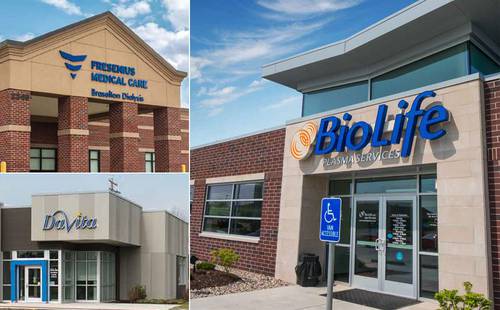Analysis of Investments

Healthcare Portfolio
AEI
AEI Healthcare Portfolio is an investment into four single tenant net leased medical office buildings that are located in 3 states. The tenants at the properties include Fresenius Medical Care, DaVita Dialysis, and BioLife Plasma Services.
Investment Highlights
- Yr. 1 Cash-on-Cash 5.09%
- Initial Occupancy 100.00%
- Est. Time Horizon 10 years YEARS
- Current Cash Flow
- Yr. 1 Cap Rate to Investor 5.12%
- Investor Purchase Price $21,748,000
- Total Offering Size $21,748,000
Loan Information
N/A
- Yr. 1 DSCR None
- Loan-to-Offering 0.00%
- Hold Period DSCR None
Tenant Information & Lease Terms
There are a total of 4 properties located in 3 states in this investment. The tenants are discussed below:
DaVita Dialysis - There are 2 DaVitas in this portfolio. They have an investment grade credit rating of Baa3 from Moody's. DaVita operates a leading provider of dialysis services in the United States. They have over 2,350 centers and serve over 200,000 patients.
BioLife - BioLife has and investment grade of BBB- from Standard and Poor's. They operate a plasma service and treat immune deficiencies, bleeding disorders, hemophilia as well as others.
Fresenius Medical Care - The lease is guaranteed by Fresenius Medical Care Holding, Inc. which has an investment grade rating of Baa3 from Moody's. They provide dialysis services to treat kidney failure. They have more than 3,360 centers located in 45 countries and have treated nearly 300,000 patients.
Key Positives
This investment is not encumbered with any debt and therefore there is no risk of foreclosure by a bank.
The leases have built in rent escalations and extension options that will increase the cash flow to the trust.
All tenants in this investment are investment-grade and have credit ratings from a major agency.
All states in this offering are Certificate of Needs states which means that the buildings will be placed in a location with stated need for services.
Key Risks to Consider
The BioLife tenant has the option to terminate their lease early, which could negatively affect the future of the investment. However, at the time of termination BioLife would pay the Net Present Value of the remaining lease payments. The tenant would not be replaceable under the current DST structure due to the lack of a master lease.
The property that is located in Danville, Illinois is in a small market with only about 25,000 people in the 5-mile radius. This could make the property less attractive to potential buyers.
BioLife and DaVita have the right of first refusal on their properties. This could make the property less attractive to potential buyers or even delay the sales process.
As the remaining term on the lease decreases, the properties may be less attractive to potential buyers as there will be less guaranteed rental payments remaining on the lease. However, the trust may sell the properties at any time if they feel they can maximize value.
Three of the leases in this investment are NN leases which place some of the responsibility of maintenance of the property on the trust. The properties are newer built which should reduce the cost to the trust but there is no guarantee that costs will be avoided. Generally a NN lease leaves the trust responsible for structural repairs and roof repairs which both tend to be very costly.
Investment Sponsor Information
AEI
According to the sponsor's website: "Founded in 1970, AEI brings more than 40 years of professional expertise to the management of its net lease property investment funds. AEI Funds are created for investors seeking the opportunity for stable income, low volatility, reduced risk, and capital appreciation.
For investors who wish to own entire properties, AEI offers a large portfolio of attractive net leased, income-producing, real estate from which to choose. Net leased properties are especially suitable for tax advantaged 1031 exchanges. AEI began offering tenant-in-common (TIC) interests for IRS 1031 tax-deferred exchanges in 1992 and was the first investment firm in America to obtain a favorable IRS private letter ruling with respect to its TIC offerings."
